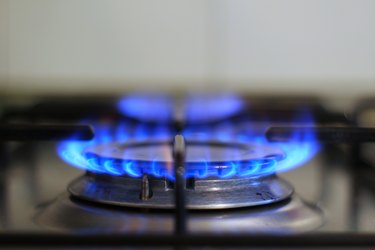
Gas stoves are popular for their quick cooking times and the ability to make precise changes to temperature during the food preparation process. These benefits are often unique to gas stoves, making them a favorite among professional chefs and gourmands the world over. However, using a gas stove can be extremely dangerous if proper precautions are not taken. In addition, children and pets who don't know how to properly use such a stove may create dangers for everyone within the home where the stove is located.
Gas Stove Safety Basics
Video of the Day
Gas stoves use natural gas to provide heat for cooking. They need to be installed properly with appropriate venting to be sure that they are safe. In addition, the natural gas supply line for your gas stove must be in good working order without holes or kinks. Gas stoves must also be properly maintained over time to ensure their continued safety.
Video of the Day
Children and pets should never be allowed to play near a gas stove unattended. Like any other stove or oven, they can become very hot and could cause burns. In addition, however, the knobs on a gas stove are often at a level that many children and pets, especially dogs, can reach. This is hugely problematic since a child or pet could accidentally turn the stove on, which would fill the home with gas until someone noticed.
Exposure to gas stove fumes, toxins and carbon monoxide are the main areas of concern with gas stoves. These appliances are perfectly safe to use if proper safety measures are taken, however.
Slow Gas Leak Symptoms
If a gas stove is left on for a prolonged period or is inadvertently turned on, it can result in too many fumes or toxins within the house. In addition, a slow gas leak can cause health issues. The side effects of inhaling gas from a stove, according to Healthline, include:
- Headache
- Dizziness
- Nausea
- Irritation to eyes or throat
- Fatigue
- Difficulty breathing
- Blistering of skin
Natural gas has no smell, which makes small leaks nearly impossible to detect. Utility companies add mercaptan to natural gas to aid in detection. Mercaptan smells very much like sulfur, similar to rotten eggs.
Dealing with Gas Stove Leaks
If you suspect a leak or overexposure to gas from your stove, you should immediately evacuate your home and call the fire department's emergency line. Do not open any windows in your home, because doing so could cause present fumes or gas to dissipate and make it more difficult for first responders to determine whether there was a gas leak in your home.
Once you have evacuated, get to a safe place. Wait for the first responders to tell you whether there was indeed a gas leak and instruct you how to handle it before you return to your home. You should also request that medical personnel evaluate you for exposure. Typically, this is a straightforward physical examination.
Emergency medical services may take your blood pressure or use an oximeter to measure the oxygen levels in your blood. They will also ask you questions about how you are feeling in an attempt to determine if you were exposed to gas. If you have a child or infant who would be unable to answer those questions, a medical evaluation is absolutely critical to ensure the safety of the child.